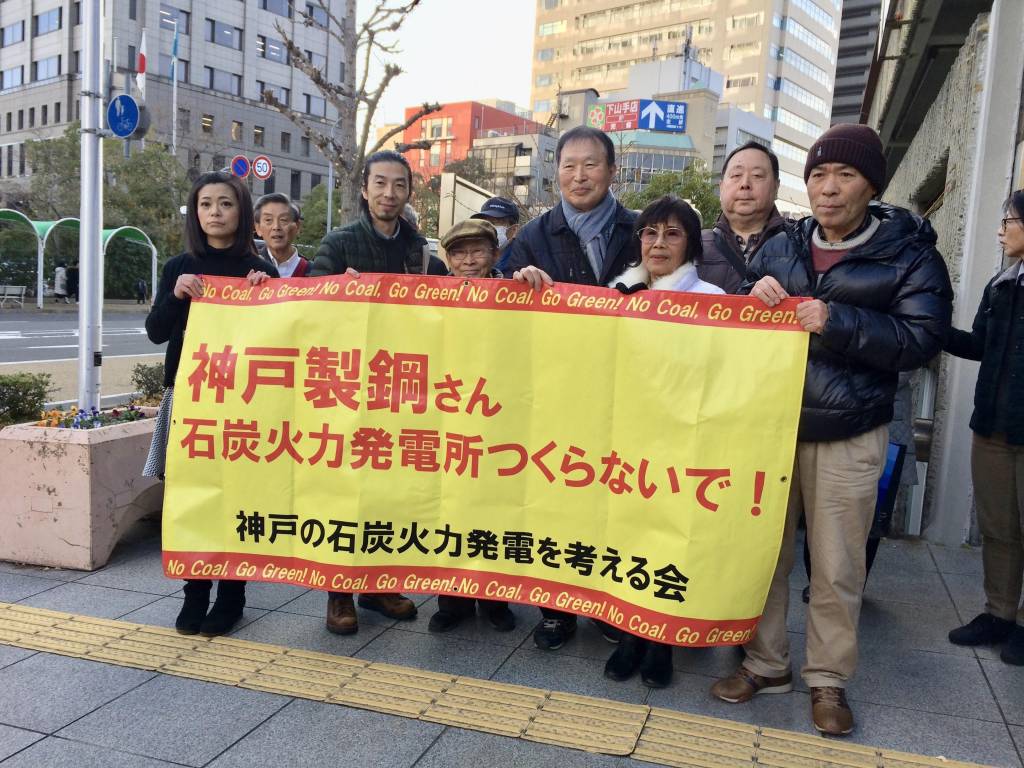Kobe, situated between the sea and the Rokko mountain range in Japan’s Hyogo Prefecture, is considered to be one of the most beautiful and attractive cities in the Kansai region. It is also home to a 1,400-megawatt coal-fired power station. Now, a group of local citizens, environmental organizations, and environmental policy and law experts is fighting to stop the construction of two new large-scale coal power plants.
The group states that the additional plants would further pollute the skies of Kobe with emissions of sulfur oxides (SOx) and nitrogen oxides (NOx), byproducts of burning coal that contribute to respiratory disease and degrade the environment through acid rain and damage to plant life, among other impacts.

Air pollution and environmental degradation will not be the only effects of adding new coal infrastructure in the city. In 2017, the Guardian released a report on the world’s cities most susceptible to sea level rise as a result of a 3-degree warming of the planet. Osaka City, directly west of Kobe, was designated as one of the most vulnerable, where 5.2 million people are projected to be impacted by global sea-level rise, storm surges, and other factors. Coastal cities along Osaka Bay, including Kobe, are also thought to be highly vulnerable.
The most recent edition of the United Nations Environment Programme’s Emissions Gap Report states that as a necessary condition for keeping warming below the 1.5-2℃ threshold, as laid out in the Paris Agreement, no new coal power can be built and an accelerated phasing out of existing plants will be needed. Further expanding coal capacity in Kobe will only contribute to global temperature increase and sea level rise.
Plans to build additional coal plants in the city are led by Kobe Steel, a major Japanese steel manufacturer headquartered in Kobe. The company has a notorious history when it comes to air pollution. In the 1970s, Kobe Steel was among ten companies that were taken to court by local residents for air pollution at the root of man-made diseases that affected thousands of citizens. 20 years later, the companies admitted their fault and issued apologies compensation to those who had been affected, settling the dispute.
Kobe Steel’s current plans to push through new coal power plant constructions despite overwhelming opposition from the community illustrates how little the company learned from its polluting past.
Reputational challenges related to improper conduct in product assessments has also created roadblocks for Kobe Steel. In August 2017, the company admitted it had falsified certifications on the strength and durability of its metals for at least a decade. In October 2017, the Hyogo Prefecture government suspended the company’s environmental impact assessment for the planned plants, citing the company’s dishonesty in falsifying its product information.
Research produced by 350.org Japan indicates that financial institutions are at fault for fanning the issue by increasing their loans and underwriting services to companies including Kobe Steel who are engaged in domestic coal development after the Paris Climate Accord was signed in 2015. Mizuho Financial, Mitsui Sumitomo Financial Group and Mitsubishi UFJ were the top 3 creditors and provided approximately 62% of the credit identified as attributable to coal development.
Currently, the battle to oppose the new coal plants are mired as the local group has decided to take Kobe Steel to court over air pollution concerns and climate change risk.
“In recent years, we have seen an increase in the number of extremely hot days and torrential rains. The effects of global warming have never felt as real as they do now” said Haruka Kubo, professor at the Konan University and one of the members leading the litigation case.
“Besides the inevitable impacts on the stability of the climate, the power plants will be built in the immediate vicinity of a population densely populated with children vulnerable to pollution and patients affected by man-made diseases. It is obvious that these coal power plants will lead to many problems, but the current political and legal systems in Japan are not effective in stopping the construction. Thus, we have decided to take matters into our own hands and decided to go to the courts.”
You can stand in solidarity with communities confronting climate change around the world. Register a local delivery action to send the message: science says we must get off fossil fuels.
The window to stay below 1.5°C of warming is closing fast. People’s lives are at stake – we must get to zero fossil fuels as fast as possible. Read the full People’s Dossier with stories on 1.5°C here.